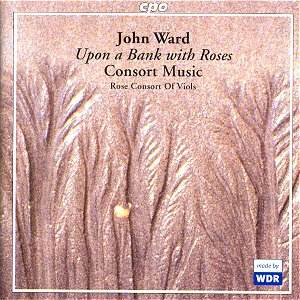An extensive and diverse assortment
of music for viols by John Ward has
survived, and this superb disc presents
a selection of his very finest pieces.
On offer here are beautifully performed
works, ranging from complex six-part
fantasias to three part instrumental
madrigals and simple two part ayres.
Although no information is provided
regarding the instruments themselves,
all six players bring great warmth to
their playing and I failed to discern
any weak link among them. The recording
quality is also excellent, although
the acoustics of Forde Abbey result
in a blending together of the instrumental
lines in the five and six part pieces
where I would prefer a greater degree
of separation.
As followers of this shadowy figure
(there are competing theories regarding
his biography) know, Ward’s greatest
and most involving works are those written
for five and six parts. These appear
to have been written later than his
vocal music and they show great confidence
and stylistic maturity. Not surprisingly
then, these works are well represented
on this disc.
Making use of dissonance, there are
some pieces that produce a hypnotic,
unsettling effect on the listener (try
track 5 Leggiadra sei a 5, and
you will hear what I mean). Others,
particularly the fantasias, are equally
mesmerising, but are played with a lightness
of touch that draws the listener into
a strange but delightful musical tapestry.
Track 15 Fantasia No 6 in C a 4 includes
fragments that, oddly enough, immediately
reminded me of the later hymn popularised
as "The Lord of the Dance",
while, perhaps the most sublime work
of all Fantasia No 1 in A a 5
(track 13), would not be out of place
among J S Bach’s late fugues.
The order of pieces is very well done,
such that the disc never becomes wearisome
(an important achievement, considering
that there is relatively little room
for textural variability in music written
for a consort of viols). Four of the
slighter works (tracks 7, 8, 16 &
17), include an organ part, ably played
by John Bryan.
Critics of Ward’s compositions point
to a certain lack of rhythmic invention,
and a mechanical application of musical
formulae which impacts upon their overall
quality. Yet, on this disc, all I hear
are beautiful, engaging and impressive
works that I class alongside the best
of Byrd and Gibbons. Full credit must
go to the players who never fail to
bring out all the rich sonority of this
wonderful music. A must buy for all
lovers of early seventeenth century
music for strings.
Peter Bright
see also review
by Kevin Sutton
.

